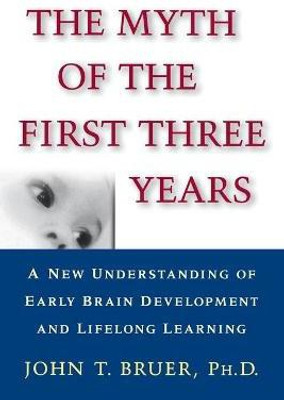The Myth of the First Three Years(English, Paperback, Bruer John)
Quick Overview
Product Price Comparison
Most parents today have accepted the message that the first three years of a baby's life determine whether or not the child will grow into a successful, thinking person. But is this powerful warning true? Do all the doors shut if baby's brain doesn't get just the right amount of stimulation during the first three years of life? Have discoveries from the new brain science really proved that parents are wholly responsible for their child's intellectual successes and failures alike? Are parents losing the "brain wars"? No, argues national expert John Bruer. In The Myth of the First Three Years he offers parents new hope by debunking our most popular beliefs about the all-or-nothing effects of early experience on a child's brain and development. Challenging the prevailing myth -- heralded by the national media, Head Start, and the White House -- that the most crucial brain development occurs between birth and age three, Bruer explains why relying on the zero to three standard threatens a child's mental and emotional well-being far more than missing a few sessions of toddler gymnastics. Too many parents, educators, and government funding agencies, he says, see these years as our main opportunity to shape a child's future. Bruer agrees that valid scientific studies do support the existence of critical periods in brain development, but he painstakingly shows that these same brain studies prove that learning and cognitive development occur throughout childhood and, indeed, one's entire life. Making hard science comprehensible for all readers, Bruer marshals the neurological and psychological evidence to show that children and adults have been hardwired for lifelong learning. Parents have been sold a bill of goods that is highly destructive because it overemphasizes infant and toddler nurturing to the detriment of long-term parental and educational responsibilities. The Myth of the First Three Years is a bold and controversial book because it urges parents and decision-makers alike to consider and debate for themselves the evidence for lifelong learning opportunities. But more than anything, this book spreads a message of hope: while there are no quick fixes, conscientious parents and committed educators can make a difference in every child's life, from infancy through childhood, and beyond.


